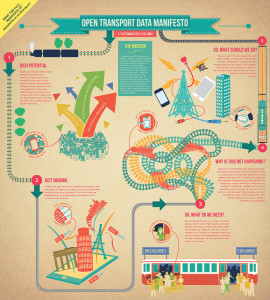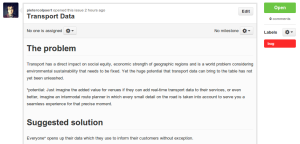The fifth in our series of guest posts by OKCon 2013 speakers is by Pieter Colpaert and Kat Borlongan who will be offering the workshop ‘Open Transport Data: the next step’ in the Open Transport Data session on Wednesday 18 September, 14:45 – 16:00 @ Room 14, Floor 2.
 Even though the transport sector plays an essential role in the fight against climate change, it seems that journalism, advocacy and academic attention is often directed to more popular flashpoints instead of what turns out to be one of the largest contributors to global warming in the world. Transportation is one of the fastest growing emission sector of carbon dioxide out there . The good news? Data can help.
Even though the transport sector plays an essential role in the fight against climate change, it seems that journalism, advocacy and academic attention is often directed to more popular flashpoints instead of what turns out to be one of the largest contributors to global warming in the world. Transportation is one of the fastest growing emission sector of carbon dioxide out there . The good news? Data can help.
A year ago, we published the Open Transport Data manifest. The manifest, written together with the EPSI platform, suggests that it is time for a different data policy for the transport sector and beyond: the true potential of transport data is yet to be unleashed. Transport Data owners everywhere need to open up data we can use to better inform their users. Here is one of those times we suggest you tune in for the next steps:
On Wednesday 18th September, between 14:15 and 16:00 at Room 14, Floor 2 at OKCon, we (the Open Transport Working Group at OKFN) are organising a workshop. Our goal in under 90 minutes: to discuss the next steps in better defining the problems at hand and suggesting, examining and perhaps even starting to implement solutions.
In order to prepare for this, we just launched a Call for Ideas: if you are coming to the workshop, define your problem and how you are tackling it (or how you would tackle it). Here is how things work following that: The workshop will be divided in four plenary debates, each of which will start off with a lightning talk introducing one of the ideas.
The workshop is open to all stakeholders and we’re hoping to welcome as wide an array of profiles possible. Transport data in itself is a very diverse data domain and publishing such data involves dealing with multiple hurdles. Statistics, geographical data, real-time alerts, dynamic lists (and this goes on) need to get out there and all these datasets have different ways of getting published: RSS feeds, plain old XML endpoints, SPARQL endpoints, RESTful webservices, HTML tables, database dumps and so on.
Here’s an example in the field of interoperability: How do you identify a stop area? How can we make machines understand that a certain bicycle garage is part of a railway station while we only have a dataset from the railway company and a geographic dataset providing locations of bicycle garage locations? A possible generic solution could be that we create a vocabulary which all dataset try to adhere to, or provide a mapping towards.
The report of the workshop will be published on our working group’s website and will be used as the vision of the working group for 2013/2014. All submitted ideas will be included.
Open Transport Data isn’t the most media savvy of the bunch, but is without doubt one of the most challenging kinds of Open Data, the kind you need to roll your sleeves all the way up for. Government agencies need to be convinced, private corporations need to be arm-wrestled with, mounds and mounds of data need to be gathered and made interoperable and let’s not even try measuring the diversity of actors from bus companies to ride-share startups to train station authorities (not often the same as the train authorities or the railroad track authorities)… Complex? Hopefully not for too long. It is our task to make it as easy as possible to open up data and to make that data both used and useful. Let’s play our part.
Pieter Colpaert believes a lot of frustration today is caused by data not being accessible (when does my train leave, how long do I have to queue, where does my money go, and so on). His goal is to increase your life quality by contextualizing data into information without you even noticing it. Apart from being a co-founder of Open Knowledge Foundation Belgium, he coordinates the Open Transport Working Group at OKFN and pursues a PhD on Linked Open Data at the University of Ghent.
Kat Borlongan is an open data enthusiast with several hats. Currently, she is the co-founder of Five by Five, an advisor to the French Government’s open data task force and a founding member of Open Knowledge Foundation France. Prior to this, she worked as the Country Director of Reporters sans frontières’ Canadian bureau and as a public information consultant to the SNCF and the International Civil Aviation Organization. As a merit scholar of the French Ministry of Foreign Affairs, Kat completed her undergraduate degree in Political Science at the Institut d’Études Politiques de Bordeaux. She also holds a master’s degree in Communication from McGill University.



klappen in de trein vechten
Exceptional beat! I’m going to newbie since you modify your web site, how do i subscribe for a blog page web-site? Your profile taught me to be some sort of proper cope. I had been small bit common of your a person’s over the air made available vibrant clear concept